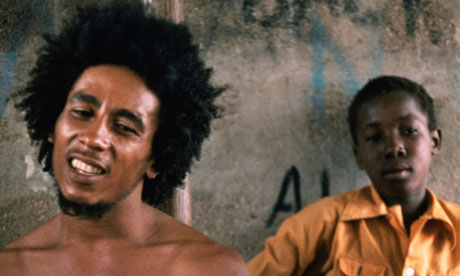
For your run-of-the-mill movie premiere, a red carpet will suffice. But for the first public screening of "the definitive story" of the world's most famous Rastafarian – held in his home town of Kingston, Jamaica – it would surely only be appropriate to upgrade the flooring to red, gold and green.
The tri-coloured runway must have seemed a cute idea to the organisers of this huge open-air event, which took place on Thursday night in the city's Emancipation Park. Local media had been publicising the opening of British director Kevin Macdonald's Bob Marley biopic for weeks. With entrance free and open to all, a crowd of 4,000 had gathered, among them hundreds of Rastas. But the dreadlocracy took a dim view of people walking on their sacred colours, and after a minor kerfuffle some sheeting was procured to cover it up.
As Macdonald's documentary relates, Marley had 13 children by nine women, and members of Jamaica's unofficial royal family were out in force, led by his wife Rita, daughter Cedella and son Rohan. Flanked by rastamen in quasi-military uniforms, white-bearded flag-bearers and a gaggle of small children, Rita led a procession through the crowds and up to the giant screen. Looking on were Macdonald himself, Cindy Breakspeare (Miss World 1976, mother of Damian Marley) and ex-Jamaican Prime Minister Edward Seaga, a frail suited figure engulfed in a red leatherette sofa.
There followed a compelling if ramshackle mixture of speeches, nyabinghi drumming, adverts for a new line of Bob Marley coffee beans and the Lord's Prayer in Ethiopian. A particular cheer was raised for a speech by the other ex Miss World in the house, Jamaica's handsome minister for youth and culture Lisa Hanna. Among the homilies to Bob Marley the spiritual guru, she made no bones about Bob Marley "the brand" having "placed Jamaica in the collective imagination of the world".
Marley the movie ranges elegantly through high camp – original Wailer Bunny Livingstone looks as if he has been invited to a Haile Selassie fancy dress party – to moments of shock – Marley's father was a white Liverpudlian in his 60s, his mother a country girl of just 16. The local crowd were quick to laugh and point in recognition, and a special cheer went up for a militant line from Peter Tosh, Livingstone's fellow Wailer. "Trenchtown rock!" shouted the man next to me.
But what was most striking was the concentration on the faces. Macdonald's movie may be full of uplifting musical performances, but it can only ever end in the cruelly premature death of an inspirational man. Even when rain began to fall, barely a soul stirred, the screen now showing harrowing pictures of Marley denuded of his locks by the predations of chemotherapy.
"Electric'" was how Macdonald described the atmosphere afterwards. "I feared they might think me an interloper, but people's engagement and emotion was amazing." Overall the sadness of Marley's death seems only to heighten the sense of joy that runs through the music he left behind. As his artistic director Neville Garrick said while a buzzing Emancipation Park slowly cleared: "Bob's not dead. You only dead when people stop talkin' about you."

